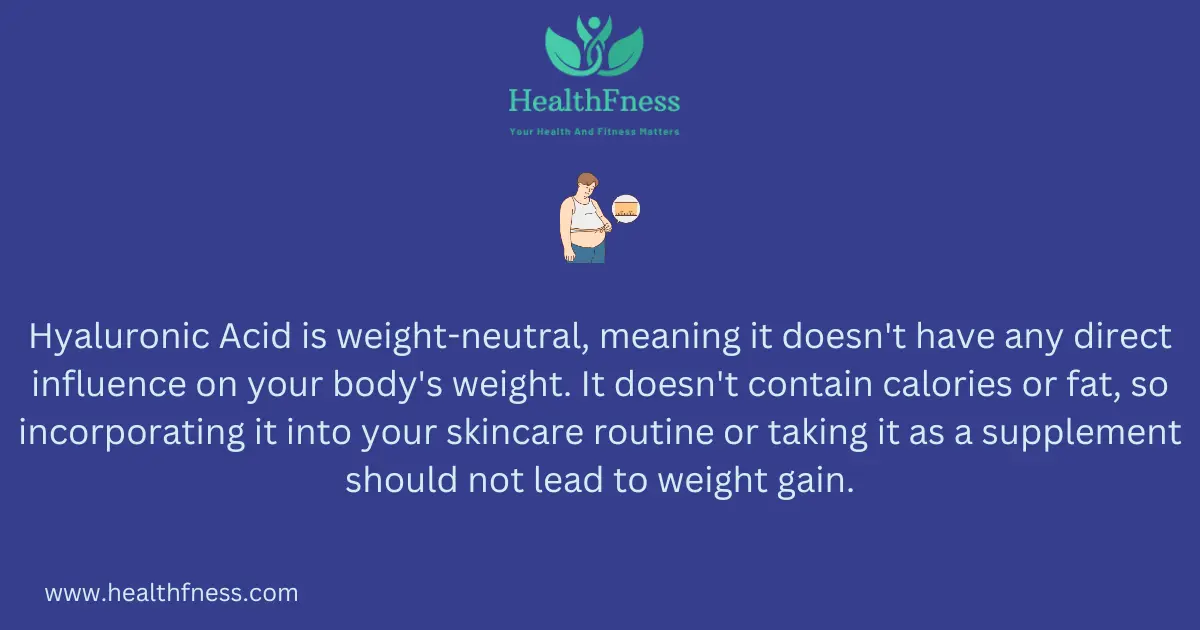Hyaluronic acid, often known for its numerous skincare benefits and joint health support(help in curing Arthritis), is not typically associated with causing weight gain.
In fact, hyaluronic acid is a naturally occurring substance found in the human body by default (by nature) , particularly in connective tissues, eyes, and skin.The function of Hyaluronic acid is to retain water, keeping tissues lubricated and well-hydrated.
Some people believe that when hyaluronic acid supplements taken orally for joint health or other purposes may cause gain weight. So let’s explore the answer to this question: Does hyaluronic acid cause weight gain?
Everything You Need to Discover About Hyaluronic Acid🧴
Before we jump into the weight gain aspect, let’s explore the many facets of hyaluronic acid. It’s not just a skincare superhero; it plays a great role in joint health (ease joint pain) and wound healing. Plus, it’s been used in medical procedures like dermal fillers. Understanding its versatility is essential.
Hyaluronic Acid For Skin Care Products🧴
Hyaluronic acid is like a sponge that helps our skin stay hydrated and plump by attracting and holding onto water molecules.
In skincare products, like moisturizers and serums, hyaluronic acid is used to give your skin “an extra boost of hydration”. When you apply these products, the hyaluronic acid helps to keep your skin moisturized, making it look smoother and more youthful.
So, basically, it’s like giving your skin a big drink of water to keep it healthy and happy.
Hyaluronic Acid Supplements (For joint health)🦴
Hyaluronic acid supplements are pills or capsules that contain a synthetic version of hyaluronic acid, which is a natural substance found in our bodies. These supplements are taken orally, usually with water, and are believed to help support joint health and keep your skin hydrated from the inside out.
By taking hyaluronic acid supplements, you’re giving your body an extra boost of this important molecule, which may help with joint discomfort and keep your skin looking plump and youthful. It’s like giving your body a little extra help to stay healthy and hydrated.
Hyaluronic Acid Supplements Side Effects💊🤕
Hyaluronic acid supplements are generally safe for most people, but like any supplement, they can sometimes cause side effects. Some studies suggest that in rare cases Hyaluronic acid might cause allergic reactions.
What is the Duration Required for Oral Hyaluronic Acid to Manifest Its Efficacy?
The time it takes for oral hyaluronic acid supplements to show effectiveness can vary from person to person. Generally, it might take several weeks to a few months of consistent use to notice any benefits.
Does Hyaluronic Acid Cause Weight Gain?
If you hear this myth that hyaluronic acid causes weight gain then you are not alone. Let’s debunk this myth together.
Fact No 1
Firstly, hyaluronic acid itself does not contain any calories. It is a molecule composed of sugar units and is not metabolized for energy like carbohydrates, proteins, or fats. Therefore, ingesting or applying hyaluronic acid should not directly contribute to weight gain in terms of caloric intake.
Fact No 2
Secondly, hyaluronic acid usually has little direct effect on metabolic pathways involved in controlling body weight. As a moisturizing agent, hyaluronic acid does not interact with these physiological pathways, unlike some hormones or drugs that can affect hunger, metabolism, or fat storage.
Fact No 3
Moreover, skincare products and supplements containing hyaluronic acid are often made with little extra ingredients. While other compounds like stabilizers, preservatives, or inactive ingredients may be present in some products, when taken as prescribed, these substances are unlikely to have a substantial negative impact on weight gain.
“At last, we conclude that there is no scientific evidence to suggest that hyaluronic acid directly causes weight gain. “

When Should You Consult Your Doctor About Hyaluronic Acid?
Though hyaluronic acid is typically considered safe, there are circumstances where it becomes prudent to seek guidance from a healthcare practitioner. We shall explore the situations in which consulting a medical expert is imperative.
You May Also Like To Read: Does Creatine Make You Constipated?
FAQS
Does hyaluronic acid make you gain weight?
No, hyaluronic acid does not make you gain weight. It doesn't contain calories or properties that lead to weight gain.
Does hyaluronic acid cause you to retain water?
Hyaluronic acid has the potential to induce transient skin hydration through water retention, yet it does not induce general bodily water retention.
What are the negative impacts of hyaluronic acid?
The negative impacts of hyaluronic acid are generally mild and may include redness, itching, or swelling at the injection site for dermal fillers. When used in skincare, it can sometimes cause irritation in sensitive skin types.
Does hyaluronic acid cause bloating?
Hyaluronic acid does not precipitate bloating. Bloating typically arises from digestive concerns and lacks a direct association with hyaluronic acid.
Does hyaluronic acid lighten skin?
Hyaluronic acid is not known for its skin-lightening properties. Its primary role is hydration and plumping.
Is it OK to use hyaluronic acid every day?
Indeed, it is generally safe to incorporate hyaluronic acid into your daily skincare regimen, contingent upon your skin's favorable response to it.
What are the side effects of hyaluronic acid on the face?
Potential side effects of hyaluronic acid on facial skin may encompass manifestations such as redness, itching, or swelling, particularly when employed in dermal fillers. In the realm of skincare, it can occasionally provoke irritation, particularly in individuals with heightened sensitivity.
How much water does hyaluronic acid retain?
Hyaluronic acid possesses the capacity to retain a substantial volume of water, thereby contributing to skin hydration and fullness.
Do you need to drink more water when taking hyaluronic acid?
While hyaluronic acid aids in preserving skin moisture, it remains crucial to maintain overall hydration by consuming a sufficient quantity of water daily.
Can hyaluronic acid dehydrate you?
Indeed, hyaluronic acid does not induce dehydration. Its principal function revolves around hydrating and preserving water within the body.
Conclusion
In conclusion, hyaluronic acid stands as an extraordinary substance and:
- Hyaluronic acid doesn’t cause weight gain due to its lack of calories and minimal impact on metabolic pathways.
- Skincare products and supplements containing hyaluronic acid typically have a few additional ingredients that affect weight.
- Rare side effects may include allergic reactions.
- Results from oral hyaluronic acid supplements may take time.
- Consulting a healthcare professional is advised for any concerns or adverse reactions.

